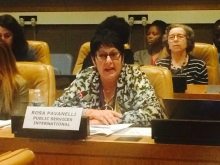Localizing the SDGs: local and regional governments actions for poverty eradication and prosperity

The side-event, jointly organised by the United Cities and Local Governments (UCLG), the Global Taskforce of Local and Regional Governments (GTF), and co-hosted by the Permanent mission of the Kingdom of the Netherlands to the UN brought together representatives from LRGs, national LRG associations and organizations, civil society and UN agencies to debate the status of SDG implementation and localization.
“Taxation is a key lever to beat inequality and to ensure socio-economic inclusion and the SDGs. Cities and metropolitan areas are the engines of global growth and development, but to be inclusive they need adequate resources to finance and invest in urban and local public services and infrastructure.
LRGs are also in charge of the implementation on the ground of global frameworks such as the Sendai Protocol on Disaster Preparedness, the decent work agenda, the Paris Agreement on Climate Change, the SDGs, and now the New Urban Agenda. Yet, when it comes to being financially empowered to do so, austerity measures, tax avoidance, international loan conditionality, international trade and tax deals, and shrinking intergovernmental transfers and unfunded mandates increasingly strip them of the essential resources they need to fund and deliver essential public services to urban dwellers and local communities." said PSI General Secretary, Rosa Pavanelli.
The main goal of the side-event was to present and discuss the first contribution to the global report on the SDG localization process.
Local and regional governments (LRGs) play a fundamental role in the process of implementation of the global agendas and, in particular, of the 2030 Agenda and the SDGs. Empowered LRGs endowed with adequate resources and embedded in a cooperative ecosystem that fosters the exchange of knowledge and practices, can become drivers of change in the way development policy and actions are designed and implemented to reach communities and peoples.
For more information:
- PSI article: Three ways trade unions are making cities and local communities more equitable and inclusive
- A trade union assessment of the outcome document of Habitat III: "What is in and what is not for workers in the final text of the New Urban Agenda
- PSI's priorities: Ten key points for Fair Cities and an inclusive New Urban Agenda
- PSI research: Bridging Tax Justice and Inclusive Cities for the New Urban Agenda (Download PDF)
- PSI LRG/Municipal sector pages
- PSI's work on the 2030 Agenda and SDGs
- Spotlight Extract: Four critical steps to operationalize the New Urban Agenda’s transformative commitment to decent work and inclusive and sustainable cities
- Full Spotlight report: www.2030Spotlight.org or (Download PDF)
- Side-event concept note and agenda
- UCLG report: National and sub-national governments on the way towards localization

